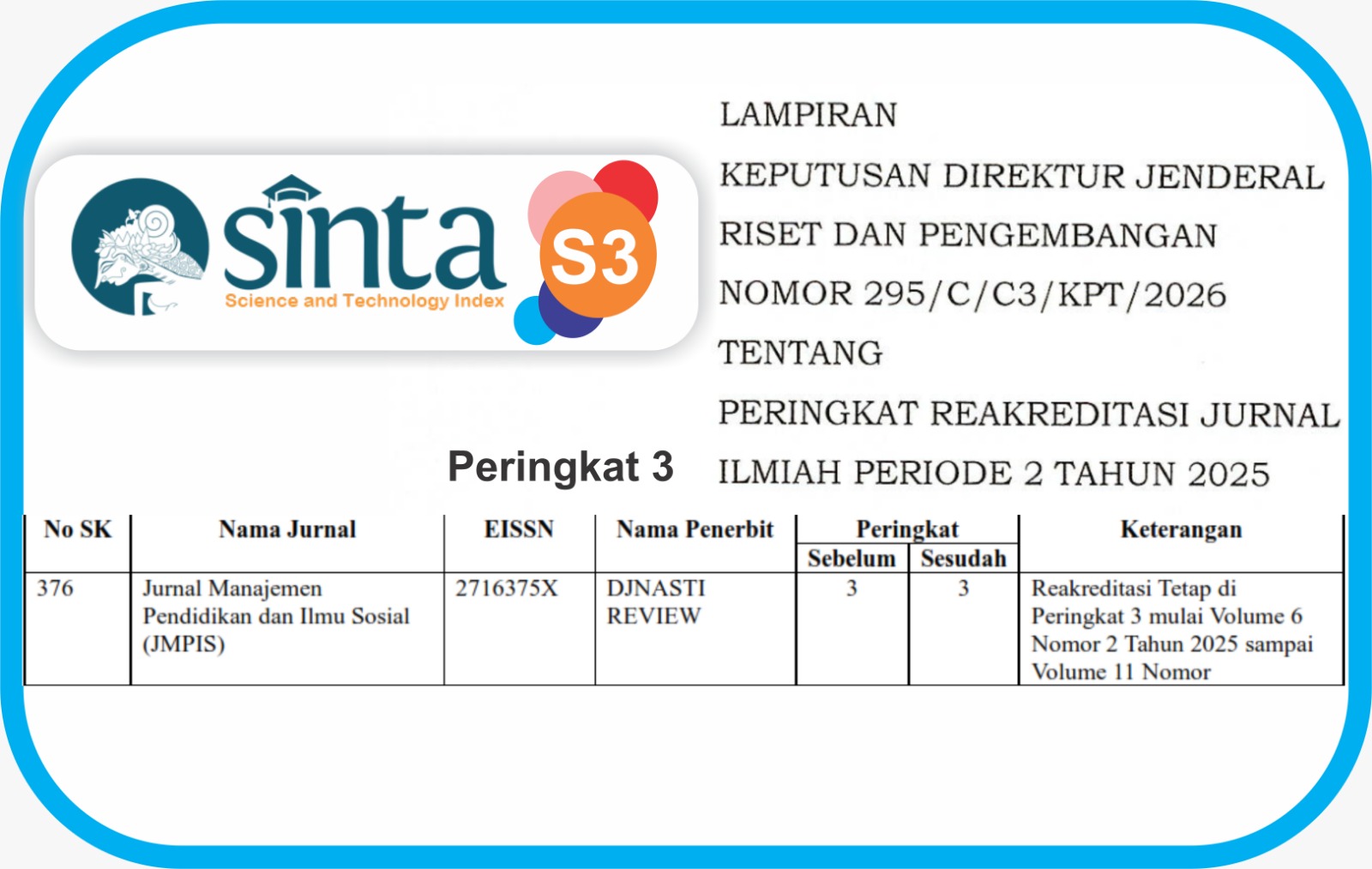Pendidikan Karakter Disiplin: Tinjauan Sistematis terhadap Tren Penelitian dan Arah Masa Depan
DOI:
https://doi.org/10.38035/jmpis.v6i4.4928Keywords:
Disiplin, Karakter, PendidikanAbstract
Tujuan dari tinjauan literatur ini adalah untuk menyelidiki tren penelitian pendidikan karakter disiplin saat ini dan arah masa depan. Penelitian ini mengkaji 22 makalah dari database Scopus yang diterbitkan antara tahun 2019 dan 2024 dengan menggunakan metodologi kualitatif yang diinformasikan oleh teknik PRISMA. Studi ini mengidentifikasi dua tema utama: (1) Tren Penelitian Strategi Pendidikan Karakter Disiplin, yang berfokus pada pendekatan dan subjek yang paling banyak diteliti, dan (2) Arah Masa Depan untuk Penelitian Strategi Pendidikan Karakter Disiplin, yang menyoroti perbedaan pedagogis, dukungan administratif, dan kolaborasi antar disiplin ilmu. Dengan siswa sebagai topik studi yang paling sering diteliti, hasil penelitian menunjukkan bahwa metode kualitatif banyak digunakan dalam penelitian kontemporer. Penggabungan pendidikan karakter ke dalam program pelatihan guru dan pendekatan multidisipliner harus dieksplorasi dalam penelitian di masa depan untuk mengembangkan lingkungan belajar yang lebih responsif dan efisien.
References
Aalto, E., & Mustonen, S. (2022). Designing knowledge construction in pre-service teachers’ collaborative planning talk. Linguistics and Education, 69. https://doi.org/10.1016/j.linged.2022.101022
Abe, M. (2020). Interactional Practices for Online Collaborative Writing. Journal of Second Language Writing, 49(June), 1-13.
Alphonsus, N. S., & Schmees, J. K. (2024). A community for expertise development–South African vocational colleges and their internal and external social characteristics. Journal of Vocational Education and Training. https://doi.org/10.1080/13636820.2024.2443918
Argawati, N. O., & Suryani, L. (2020). Project-Based Learning in Teaching Writing: The Implementation and Students' Opinion. English Review: Journal of English Education, 8(2), 219-226.
Baddal, B., Lajunen, T. J., & Sullman, M. J. M. (2022). Knowledge, attitudes and behaviours regarding antibiotics use among Cypriot university students: a multi-disciplinary survey. BMC Medical Education, 22(1). https://doi.org/10.1186/s12909-022-03853-2
Bager-Elsborg, A. (2019). Discipline context shapes meaningful teaching: a case study of academic law. Journal of Further and Higher Education, 43(4), 508–520. https://doi.org/10.1080/0309877X.2017.1377162
Balim, A. G., Turkoguz, S., Ormanci, U., Kacar, S., Evrekli, E., & Ozcan, E. (2014). Teachers' View about Problem Based Learning through Concept Cartoons. Journal of Baltic Science Education, 13(4), 458-468.
Candarli, D., & Jones, S. (2019). Paradigmatic influences on lexical bundles in research articles in the discipline of education. Corpora, 14(2), 237–263. https://doi.org/10.3366/cor.2019.0170
Choudhury, M., & Wu, H. (2023). Disaster Education in the Context of Postsecondary Education: A Systematic Literature Review. Natural Hazards Review, 24(3). https://doi.org/10.1061/nhrefo.nheng-1778
Divayana, D. G. H., & Suyasa, P. W. A. (2022). Evaluation of the Implementation of Synchronous Learning Based on Google Meet during the Covid-19 Pandemic Using the CSE-UCLA Evaluation Model. Lectura: Journal of Education, 13(2), 149-163.
Georgiou, H., Turney, A., Matruglio, E., Jones, P., Gardiner, P., & Edwards-Groves, C. (2022). Creativity in Higher Education: A Qualitative Analysis of Experts’ Views in Three Disciplines. Education Sciences, 12(3). https://doi.org/10.3390/educsci12030154
Hayes, M. S., Liu, J., & Gershenson, S. (2022). Who Refers Whom? The Effects of Teacher Characteristics on Disciplinary Office Referrals. www.iza.org
Hidayati, N. (2020). Integration of Character Education in the School Curriculum. Journal of Character Education, 10(2), 123-135.
Hudoshnyk, O., & Krupskyi, O. P. (2022). Science and comics: from popularization to the discipline of Comics Studies. History of Science and Technology, 12(2), 210–230. https://doi.org/10.32703/2415-7422-2022-12-2-210-230
Kementerian Pendidikan dan Kebudayaan Republik Indonesia. (2017). Pedoman Pendidikan Karakter. Jakarta: Kemdikbud.
Kusumaningrum, S. R., Dewi, R. S. I., Mardhatillah, Pristiani, R., & Rizal, M. S. (2024). Pengembangan Kecakapan Literasi melalui Pembelajaran yang Menyenangkan bagi Guru SD Negeri Pandanwangi 3 Malang. I-Com: Indonesian Community Journal, 4(4), 2896–2905. https://doi.org/10.70609/icom.v4i4.5728
Lickona, T. (1991). Educating for character: How our schools can teach respect and responsibility. Bantam Books.
López, H. A., Ponce, P., Molina, A., Ramírez-Montoya, M. S., & Lopez-Caudana, E. (2021). Design framework based on tec21 educational model and education 4.0 implemented in a capstone project: A case study of an electric vehicle suspension system. Sustainability (Switzerland), 13(11). https://doi.org/10.3390/su13115768
Maisaroh, A. A., & Untari, S. (2024). Transformasi Pendidikan Karakter Melalui Kebijakan Pemerintah Di Indonesia Menuju Generasi Emas 2045. Jurnal Kebijakan Pemerintahan, 18–30. https://doi.org/10.33701/jkp.v7i1.4347
McLaughlin, J. E., Lake, D., Chen, E., Guo, W., Knock, M., & Knotek, S. (2023). Faculty experiences and motivations in design thinking teaching and learning. Frontiers in Education, 8. https://doi.org/10.3389/feduc.2023.1172814
Mete, D. E. (2020). Fostering Critical Thinking Skills in ELT through Video-Based Reflection. Journal of Language and Linguistic Studies, 16(1), 104-125.
Mokiy, V., & Lukyanova, T. (2021). Transdisciplinarity: Marginal Direction or Global Approach of Contemporary Science? Informing Science, 24, 1–18. https://doi.org/10.28945/4752
Muhajirah, M. (2020). Basic of Learning Theory (Behaviorism, Cognitivism, Constructivism, and Humanism). International Journal of Asian Education, 1(1), 37-42.
Pernantah, P. S., Nova, N., & Ramadhani, A. S. (2021). The Use of Google Meet Application in Supporting the Effectiveness of Online Learning during the Covid-19 Pandemic at SMA Negeri 3 Pekanbaru. Pedagogy: Journal of Education Science, 21(1), 45-50.
Qian, G., Qiu, F., He, J., & Zhang, L. (2025). Current situation and characteristics of discipline crossing in Chinese first-class comprehensive university based on the statistical analysis of high-quality academic output in the past five years. Education and Information Technologies. https://doi.org/10.1007/s10639-025-13340-y
Richter, T., & Kjellgren, B. (2024). Engineers of the future: student perspectives on integrating global competence in their education. European Journal of Engineering Education, 49(3), 474–491. https://doi.org/10.1080/03043797.2023.2298319
Rizki, A. (2021). Challenges of Character Education Implementation in Schools. Journal of Education and Culture, 5(1), 45-58.
Ryan, K., & Bohlin, K. E. (1999). Building character in schools: Practical ways for to implement character education. Jossey-Bass.
Saputra, M. D., Joyoatmojo, S., Wardani, D. K., & Sangka, K. B. (2019). Developing Critical-Thinking Skills through the Collaboration of Jigsaw Model with Problem-Based Learning Model. International Journal of Instruction, 12(1), 1077-1094.
Stevenson, E., & Thompson, P. (2025). Teacher leadership for integrated STEM education: Identifying what effective leaders need to know and do. School Science and Mathematics. https://doi.org/10.1111/ssm.18322
Sukardi, S. (2019). The Role of Family in Children's Character Education. Journal of Education Science, 15(3), 201-210.
Sundermann, A., & Fischer, D. (2019). How does sustainability become professionally relevant? Exploring the role of sustainability conceptions in first year students. Sustainability (Switzerland) , 11(19). https://doi.org/10.3390/su11195155
Tanucan, J. C. M., Wider, W., & Sofyan, D. (2023). Predictors of Filipino physical education teachers’ intentions in the use of exercise as punishment. Pedagogy of Physical Culture and Sports, 27(4), 289–296. https://doi.org/10.15561/26649837.2023.0404
Urban, M. (2022). Scholarship in times of crises: towards a trans-discipline of early childhood. Comparative Education, 58(3), 383–401. https://doi.org/10.1080/03050068.2022.2046376
Vázquez-Parra, J. C., Castillo-Martínez, I. M., Ramírez-Montoya, M. S., & Millán, A. (2022). Development of the Perception of Achievement of Complex Thinking: A Disciplinary Approach in a Latin American Student Population. Education Sciences, 12(5). https://doi.org/10.3390/educsci12050289
Vernede, S. (2024). How does taking a praxis-based decolonising approach to primary history education impact pupils’ perceptions of Romans and Roman Britain? Education 3-13. https://doi.org/10.1080/03004279.2024.2369244
Yulianti, A., Atmoko, R., & Sukma, I. (n.d.). Penguatan Karakter Toleransi Melalui Metode Bercerita Pada Usia Sekolah Dasar. In Alpen: Jurnal Pendidikan Dasar (Vol. 7, Issue 2).
Zhai, X., He, P., & Krajcik, J. (2022). Applying machine learning to automatically assess scientific models. Journal of Research in Science Teaching, 59(10), 1765–1794.https://doi.org/10.1002/tea.21773
Downloads
Published
How to Cite
Issue
Section
License
Copyright (c) 2025 Annisa Hasanah, Sri Untari, Shirly Rizki Kusumaningrum, Radeni Sukma Indra Dewi, Ratna Ekawati

This work is licensed under a Creative Commons Attribution 4.0 International License.
Hak cipta :
Penulis yang mempublikasikan manuskripnya di jurnal ini menyetujui ketentuan berikut:
- Hak cipta pada setiap artikel adalah milik penulis.
- Penulis mengakui bahwa Jurnal Manajemen Pendidikan dan Ilmu Sosial (JMPIS) berhak menjadi yang pertama menerbitkan dengan lisensi Creative Commons Attribution 4.0 International (Attribution 4.0 International CC BY 4.0) .
- Penulis dapat mengirimkan artikel secara terpisah, mengatur distribusi non-eksklusif manuskrip yang telah diterbitkan dalam jurnal ini ke versi lain (misalnya, dikirim ke repositori institusi penulis, publikasi ke dalam buku, dll.), dengan mengakui bahwa manuskrip telah diterbitkan pertama kali di Jurnal Manajemen Pendidikan dan Ilmu Sosial (JMPIS).











































































